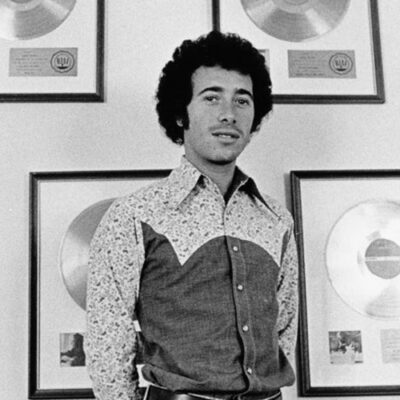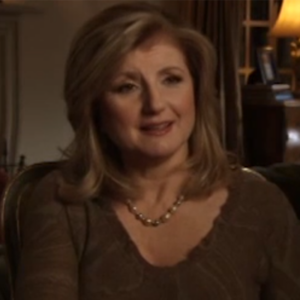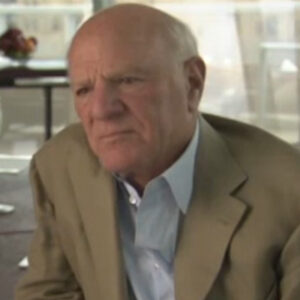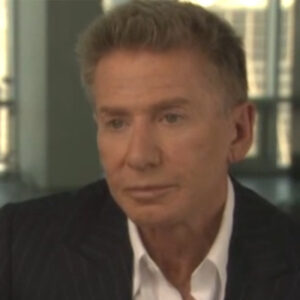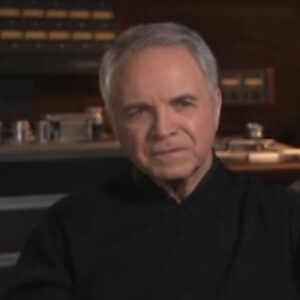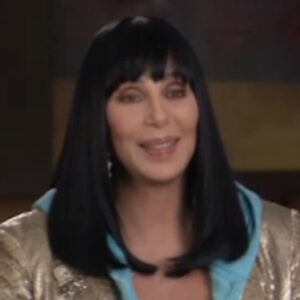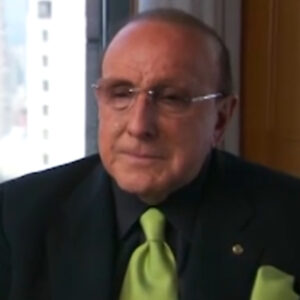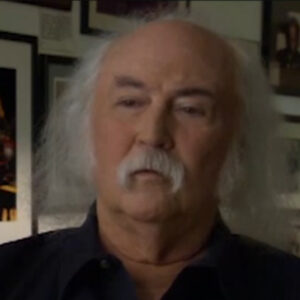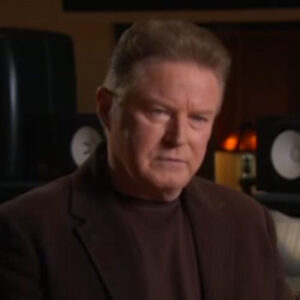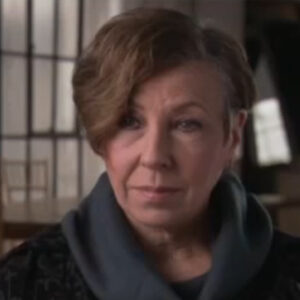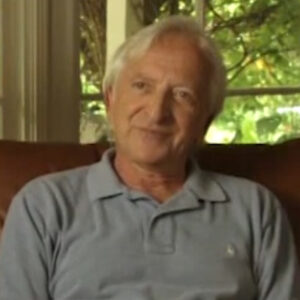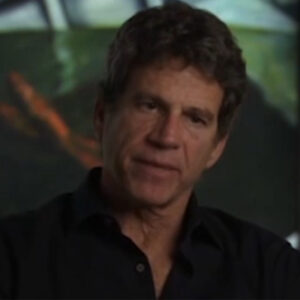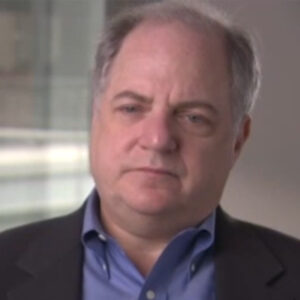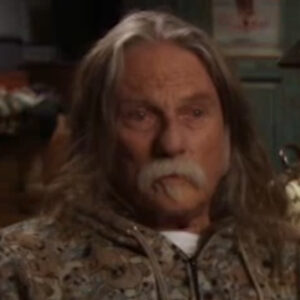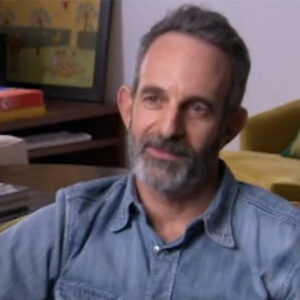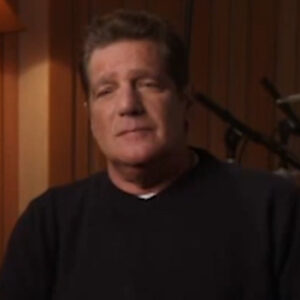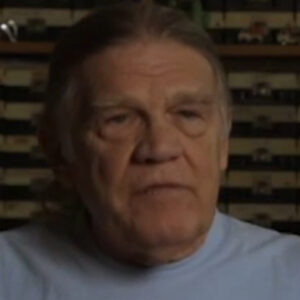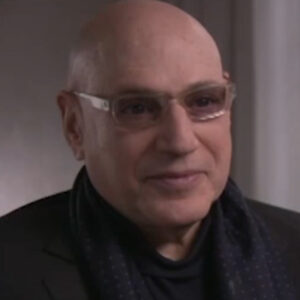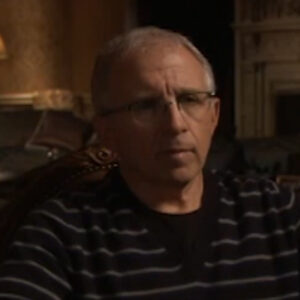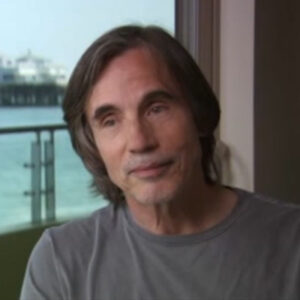Speaker So your Uncle George Burns.
Speaker Yes. You look like my uncle. Yeah. When I smoke cigars, I’d look a lot like him. You got to tell me that you’re the expert. I don’t have I don’t have his talent, but I have a little timing when I tell that story.
Speaker So and I’m comfortable in front of people, which he was always comfortable. Yeah.
Speaker How did that how did George Burns help you get to you, Morris?
Speaker Well, sadly enough, I lost my mom at the age of 48. And I had just gone to enter at NYU and she died suddenly and I dropped out of school. I never liked school. I’d rather speak with the girl. Is that where the sky is? In sports and all that. I was never a student. And I’m sorry about that now. And I. I had a possibility. It just drifty and my uncle loved by. But there were 12 of that family, 70 girls and five boys. So he called a blast. Fogel, who called that Lefkowitz of the org said Louis Weisheit. You know, could have come to work for that office boy. And I do my job in August 1937 and I left him and only seven shows I could hold a job. Didn’t have much talent for math for that. No, but it was a great, great run. It was interrupted by the war and most of fellows in the office were drafted, said they were in the entertainment business. I wasn’t that smart. So I ended up not with Eddie in the entertainment world at all. I was just a G.I. Joe. I ended up in Italy with the 10th Mountain Division. Then that was that was enough war. That was enough for me when they came home.
Speaker The company that put away 10 percent of all our salaries for why we returned.
Speaker And as my uncle once said, it only did it as I was here. And he said, I’ve got Louis Weiss a job with William Morris, Elvis at nineteen thirty seven.
Speaker He was making twelve dollars a week. Seventy years. He must be worth a fortune.
Speaker So that was that was cute.
Speaker But I was very close with Bionicle. I felt almost like his son as far as affectionate warmth is concerned. And as I grow in the business, I saw more and more of what he really represented.
Speaker His warmth, his love for people, his talent, certainly his philanthropy is very quietly. And in fact, the two key streets at the Cedars Sinai Hospital, as one as is George Burns. The other corner is Gracie Allen. And that’s that’s the two sides of the hospital. But he was great. Just great.
Speaker I loved that you said you started as an office boy. Yes. The same thing starting in the mail.
Speaker Yeah. Oh, yeah. Was below. Below email rowboats. No, not really. An office boy.
Speaker It always days delivered messages had to be had to replace a receptionist when she went to lunch.
Speaker Had to learn shorthand in Taipei. Because if you’re good enough you ahead to becoming a secretary to an agent. They call secretary secretaries always a lot assistants to an agent. And if you’re an agent for long enough and you learn a little something, you get moved ahead and you work to be me. A graph machine. You did. You did everything. You were just a gofer. You were the total golfer. You delivered contracts. You got things. You went out, you sat outside and actors would have to sign a contract. They’d run it back to the office those days. And there were that many of us, just a handful.
Speaker Was that the myth of beginning in the mail? Is it really a myth? I mean, it really.
Speaker No, no. It was there was no mail room. It was just a bunch of gophers. Then as time went along and as a business built and as a young guys in the mailroom started developing and had then we realized the need for a training program. But that was that took quite a while.
Speaker When did that happen? When did. The mailroom. Become. Become thought of as a training ground.
Speaker I would say.
Speaker I would say after World War Two. Yeah, I would say around then it became formalized that we would look for young people to bring in.
Speaker Yes.
Speaker Now, working in the agency business when you started, and certainly through yes. But in a certain period, 40s, 50s at the beginning of telling me how the agency business really was the place to be. Can you set that scene for me? You are in the agency business network.
Speaker Well, in the first place, as far as the East Coast was concerned, the agency business, you are all parts of the agency business as an individual agency was a group of individuals. And you had clients. Depends what level you were at. When I started, my clients were all young comedians. I would find I was given the territory to to watch and I would watch the territory and I’d see a comic and I’d sign a comic or I’d see a writer and I’d sign a writer or a cigarette. I’d sign a cigar. And then all of a sudden I had my own group of clients that belonged to the agency. But as the clients grew and they moved into different areas. All of a sudden I’m in that next area.
Speaker So any actor, writer, director who I was involved in in a small area, if he ended up in the picture business a I’ll give you an example. Chevy Chase. I went downtown. The head of ABC at one time and see a comedian competing with Chevy Chase. And he was a sketch type of comic, but he looked like Carey Grant. He was a great looking young guy. So I said, I’d like to represent you. So Ford so far and so forth. I said, you’re funny. You’re good looking. You like to see a big career for you. And he said all about writer. I said, I’ll get you a job as a writer. You know, I know. How do I do with a talent? I know with a rich talent what was wise. And I think I got him on one of the show at the Smothers Brothers. I don’t know. I got one of those shows and he caught on. And then he could get it Saturday Night Live and live it. And then he made a movie while doing all these scenes from somebody who found a variety type of former into who said you thought he was a writer for all these see move the age and the different areas. And to people like him, you get to know the network people and it’s always expanding. The people you know, are expanding. And if you have the abilities, you grow with your clients. And I love my business. I never looked at my watch. I only have time. Only time I ever looked at my watch. See how late I might be for the next day. And I learned from Abel as well. Very important lessons of integrity, honesty, return our calls.
Speaker Stand your client. If he’s not doing well, even more than when they’re doing well, because you never know who the star is going to be and they it so forth over our basically right on it very, very efficiently. But it was a family feel. Everybody knew each other very well. You have to have it. You didn’t have to did have dinner with them if you’d want to. I the point. But we all knew each other very well.
Speaker There was a smaller business for me.
Speaker Yes. And he told some wonderful stories.
Speaker We’re continuing to take my advice about how you might prefer to go out to listen to the acts in Harlem. In the Savoy. Yeah. Yeah. Oh. Can you talk about your experience? Fine.
Speaker The day after the after the war ended, I was no longer an office boy. I was a married man and I really had to work hard, pay attention. So my school was the William Morris Agency and they gave me a tell territory once they felt that I knew what I was doing. And they gave me it. They told me to go out and see the little axe around the New York area and Jersey area. And I would do that. I see the talent and I get to know them. And then as I grew, I started signing this talent and I got larger areas.
Speaker So for me, little nightclub booker cause I skipped the I missed of. All right. The stage world avoids all. But I was at the beginning of the I was at the end of the band era and all these big bands had ABC, they had were playing in the hotels. And as I became more important, I got to know somebody whose hotel people and I saw the booking talent. And the audiences and the various cities didn’t want to go to see so-and-so at a hotel and the. They wanted to see talent. So I started booking talent that was so talented. He chased hotel in St. Louis. And so Ted’s at Palmer House in Chicago and even cracked the AMC boardwalk, the Waldorf. I sold talented. So I sold talent all over. And little by little M.J., we became aware that there’s a talent guy around that is putting talent anywhere where bands were. And let’s face it, it wasn’t me. The audience will get tired of going out. They don’t want to go out and dance at watch. They’d rather be entertained a different form. And at that point, MJ tried to hire me and I would never leave my company. I’d never leave anybody at all for any reason because he was so hot. He he gave us the company for nothing. We paid a dollar a share. If you had to have the dollar, you lend it to you. So.
Speaker So I’d never leave the company.
Speaker I lost my train of thought here for a moment. You talk about the man, which is certainly more suspicious. Yes. He also didn’t go to college right now.
Speaker So you learn the business when you’re an office boy, when you’re delivery. Yes, it’s a small business, but it’s a very complicated business. People think that the talent world is you. You got an IQ yourself. You get 10 percent of his salary and you smoke a cigar. That’s not the way it works. In order to be to know the talent business, you have to know the entire talent business. If you can sign talent, you’d be a hit. If you can’t sell talent, you give me a hit. If you do, I manage a bet. You can be administratively sound. If you could do all three, you should be the president of the company. Four seats are also three special areas how you operate an agency. So I started watching the young people and the cream always rose to the top. You could spot real fast. You’ll get someone from Yale and someone who never went to college but had street smarts and street smarts was but more important than the bucks block smarts and the whole life pattern, that’s maybe different. But in the entertainment world, you have to know street smarts and relate to people. And it’s not book learning. There are lot of people to get to know and you have to learn how the cycles work. It is a lengthy, complicated business of not too many people, and it’s now become an international world of not too many people. I wish I was 20 years younger. I’d jump back in because everything has changed. The technology has changed everything around. All of a sudden, there’s no level playing field. Advertisers don’t know where to put their money. Talent. Don’t know where it’s going to be. It is attrition and healthy areas. It is street sitting out there that we have to recognize that I want to do it. It’s exciting time. But anyway, you’re these people and I always watch them. So when you see a Gaffin pop up or a Dila pop up and then Ovitz pop up, you see these people, whether they were educated or not, is not the point. The fact they knew how to connect. They understood that they were sport. And I would say of all the people I’ve watched and I’ve watched many of them, and they’ve all become the ones I felt would be successful, I believe, for the most part. And the high 90 percent became quite successful. The Adella be at Barry Diller, B at Bykov. It’s Ronnie Meyer. Irwin Winkler. There are many, many Agent William Morris graduates who all over the all over the place and all doing very well, and they all know each other quite well. But let’s face it, I think it’s helped. I think there’s a brotherhood out there somewheres that recognize each other. So I’d always go after the young people. And Gafford was easy to spot. I was uninvolved as Ari. I’ve heard a lot of stories. I Peyto attach that Adawi.
Speaker But I spotted him real fast, says Kiawah. Bright, energetic, street, smart had a personality and knew how to connect. We spoke with him when he spoke to you. He got through. We spoke with him. You knew you don’t have to say it twice. You would get it. And you knew he had a direction he was going in. I don’t think he knew what it was at that point. But you knew. He knew he was going to say it’s a jewel. I don’t wanna lose him. So I grabbed him quickly. If somebody be close to me and I was in the business of putting television packages together. And in those days, I insisted that shows we had on the air.
Speaker I wanted all the agents to read the weekly scripts, not that they would edit or anything. That’s not the point. They would learn the business. When you read a lousy script, you know it’s lousy. You read a good script. You know, it’s good. When you read a script. You could read what the director should be doing. You learn the business. And it’s a tough job to sit that night and read scripts where your water go out dancing or be with your wife or your girlfriend or whatever. But I would insist that he’d always say to me, Lou, there’s a girl called Laura Nyro, so forced is so good. We should be in that war, in that music business. Lou, why are we in a publishing? I said, David. Scripts have to be read. There is so much to be done. But that’s just a little bit. He always had his eye on something that was ahead of somewheres, had a very warm personality, a great humor. It was a pleasure to be with my wife, my Alice. She looked at him as one of the children. What about children? You know, he was very easy to get along with.
Speaker Very easy. And it was a pleasure.
Speaker And then he started to grow. And then one of our competitors went after him. And at that point, I think he was making five hundred dollars a week with us. And that left Kawas ran the New York office. And David said to me one day, Louis said, I’ve got an offer from, I don’t know, visit GHC or ICE. I was the same company would but to. Well, what are that family of of of Jozo companies start out with J.C. ISEF or whatever they became. A lot of them are still around though as Isaiah. He said, I have an offer there. They were offered me twelve hundred fifty dollars a week and I’ll be only get that abusing the parliament. I said the music business is a big, complicated business. You’ll be great in the music business. I would like you to stay here. We’ll try to maneuver you into the music area because we did have a music department, certainly. We have variety talent. We have bands. And we would do that. Hang around. You’re going to happen near this place. That was where I went to night, Lefkowitz. He said off from seven hundred dollars. I said that he has an offer. Twelve fifty. I can’t do that.
Speaker And I spoke to David. He looked at me as David could and should. You must be crazy nice. Sit tight. You stay here in front. I got back from I think I said Graham without. That’s.
Speaker OK, so David, you said David, so you kidding go.
Speaker So now, without that love, could this authority. I said, David, you’re going to be in the music business at his company. But you have to put it as little time you learned as part of it. So the one. And I know I can get him to go to a thousand dollars a week, which was a fortune for four young, a young man in those days. He said that very clearly. And he left us. I could hold on to him. And I was heartbroken because. When you get you get that kind of talent, maybe they listen. They hear it, you know, they did what they’re supposed to do. They’ve done their homework and they can anticipate where you’re going and the conversation. You could talk more shorthand than go along in a longer ramble along.
Speaker You grab these are valuable people. And I would consider him certainly clearly no one. I mean, clearly without cause he had the whole package and he went into every he went into every business.
Speaker Doesn’t make me a genius. He was that good. And that’s what it was. But I stayed close to David, not as personally as I would have enjoyed, but I was a very busy young person myself. But as I would know, move into different layers of my company. And as I was growing, I would watch what he would accomplish, how he went into the management slash music business, publishing business, asylum records, electoral whatever to get. Fidrych All the things I watch, everything that happened with him. I studied as if it was part of my family because I there’s a I know there’s an ancient word called kvell. I fell when I would read that A Shop of Horrors opened up Broadway. David Geffen for Doors.
Speaker That’s wonderful. And I watch. I go on and on and on, over and over. And it was always rich with stories. So whenever I see him, I’d hug my kids like I would love my son.
Speaker And I might one day always watching the television operation that a company had its big office, New York. And I was right leg up at back. And I was full of myself, I’m sure. And then Burrage David wearing jeans or something else, you know. He said, look, I’m getting married. I said, that’s great. Who you marry? You say Cher. I said, Didn’t you miss something? She happens to be married to fight with Sonny. I have money here. What are you talking about? He said, no, that’s over. I’ll marry her, so forth. And of course, at that when that one passed. But he had this enthusiasm that you could you couldn’t cut it down anyway. And one time our star, London and I had responsibilities those days for the London office and.
Speaker So, Alison, I and two friends were the Dorchester and then burst David jeans and a short Navy P p jacket of some sort.
Speaker Lo Allah. So forth. So huggy. And so what are you doing for dinner? Well, I would to have dinner. Come join us. You said no. No. You see, I mean, I must take you to a restaurant I want. It took us to. Mr. Chow is in London, which I hadn’t been to.
Speaker It was delightful. Any other bottle of Dom Perignon. Now, I knew I was. I’d take the check. Anyway, it didn’t bother me, but I suppose he’s really moving along. Well, it was the way I was able to get that check.
Speaker That was David’s point. Actually, he was so he was in his own way very much himself. But he always he always reached out. Well, I always I was always part of him. I enjoyed that. So let’s go back. Okay. His name was Sonny Warbling. He said, Louie, I think they’re interested in your company. Would you be interested being part of why? No. I said, wow. I said, that really sounds exciting because that also would be a perfect fit. They have all the clients. I was selling talented. I was selling shows to slick commercials, too. And they had a PR end. And we had all the software. We had the Tarlow is a perfect fit and we even employed for the fall for that assignment. Felix wrote to do some inside research on it and advise us. And it was a Gildas show that Dr. Delaporte, that you should have been made. It could have been made. But they were in the production business. They were producing commercials. They were producing different things as producers. And they were using paid actors. And that was a too big a conflict of interest. And the thing fell apart.
Speaker What stories have you heard about David before you?
Speaker Before I met him? Yes. You said you said earlier when you met him, you’d heard all this.
Speaker Oh, just. The basis that he wrote he wrote his own recommendation from school. That was it.
Speaker Do you mind telling that story? Because our audience may not know that.
Speaker I don’t know that they would like that story being repeated himself. Yeah, well, that’s the story as I heard it. And I never saw the letter I was out of all with his hiring is about a sort of quitclaim type of thing. I just wasn’t there. He was hired.
Speaker But I learned subsequently that he came in at the crack of dawn when Amayo came in because he hape he gave himself a comedy. He wrote himself a letter accommodation and put it on college stationery and a proper stamped a proper envelope. The proper cydia came from endorsing what he what he had written down as official. And this was a high compliment, that of Horace. Our personnel were hiring people concerned. And so they hired him. But he OHP, but he ended up waiting for that letter to come in, saying he never went to that school. So, of course, we would have notified the school that I heard. Which I’m sure we did. But he steamed the letter open and whatever he did, he change around and he made sure that their recommendation was there on a positive basis and that it was he was going to be at UCLA or.
Speaker Yeah, I have no idea what it was, but I picked him up later on when he was any office and he was running errands and he was actor. He was visible and he always had been visible. You know, people were attracted to him and he’s attracted to people.
Speaker And his is just as I say, the cream rises to the top. He rose quickly.
Speaker So let’s see. He had energy. Immense energy.
Speaker What besides street smarts, smarts, energy? Charm and all of that. What what made David different from all those other people?
Speaker Why was he the one everyone noticed? What were his specific qualities? Well.
Speaker I mean, if it was a variety, they could have been a bottom. He had the head, he knew he knew things that could happen and he helped make them happen.
Speaker He knew it. He knew talent.
Speaker He knew talent insofar as performers were concerned. The singers were concerned. He just knew it. He spotted it. It didn’t have to be just someone like a Streisand to show his upper or and Joel said in his day. They just explode. He knew it. He got young people and he made stars out of an issue. And he dealt with it with great groups. And he was remarkable. So it’s an instinct for talent.
Speaker Give everyone at Lea Morris feel the same way that they that you did.
Speaker Well, I I’m sure they did. I’m sure they did. But I might say but I sort of grabbed him for myself in those early days and. To talk about leftwards, his relationship with him, with that lefko, which was not love, which was a. Sweetheart of a person. But if he didn’t know him, you’d get a little a little nervous because he was an attorney, an accountant, an administrative giant, knew what he was doing. But he also was really not in the show business end of it.
Speaker But he was both generous man as far as information is concerned. But he ran a tight ship and erratic good company.
Speaker And I became very close with it. He had a great wife, Sally, who embraced all the young people in the company. That’s my, uh, my own. Alice did as Alice got older. All your young people were always at our house to always clients for our house and major stars and new people are always there.
Speaker We always entertain that business has changed now. A lot of business is done in restaurants and always age. You get to know him personally. Take him to your house. I mean, I’ve had I’ve had dinner with heads.
Speaker I’ve identified the head of NBC, ABC and CBS, where whoever the executive was, whatever level it was at their house. My wife was a great eight nine. My wife was a great aide insofar as Tallulah was concerned, because you’re always wives around or girlfriends are on or something who had to be dealt with somehow some way. And Alice was great at that. So Sally Lefferts was that kind of a person. Although.
Speaker More New York bound than we were. We were traveling people. Now, David worked for Mr. Mathis first, and then he went to work for you.
Speaker Right. How did that come about?
Speaker I don’t remember. I don’t know if he did before. Before that. Lefkowitz first he worked as an office boy. You’ve ran average for him. Oh, yeah. Yeah, no. So whatever he did, he did.
Speaker So tell us about Jerry Brandt.
Speaker Jerry Brown. That’s going back pretty far. Jerry Brandt was a music agent. And he was also one of the office boys originally. And he became a and I’m doing the best I can. Now he became a.
Speaker Manager publisher Toure Booker is thinking that’s what he went into, the music business as it was bursey, wide open with the or the new new elements.
Speaker And he did quite well, as I recollect, somewhere along the line. There were some issues or problems that I can’t recollect right now. I think things turned a little difficult for him, but I’m not certain and I haven’t heard his name in years now.
Speaker So that’s all I know about Jerry Brant. I knew him quite well.
Speaker The story goes that the day that he’s the one who first signed somebody, tough talk aimed at the future for young agents in the music business.
Speaker Yeah, very well. Could be. Very well could be.
Speaker So what was Whitmore’s his attitude about rock and roll, the 60s?
Speaker Well, we were very much where we were for. We were very involved in all face the music business.
Speaker Where were the ones who had Bruce Springsteen? We had all the great stars. And today our music business is bigger than ever. I would say I would guess our music business is as big as it to two other major agencies combined.
Speaker And we have a great national office.
Speaker And back in the 60s. Wasn’t there some resistance to rock n roll?
Speaker We were very we were very active and they were very active in that. But we’re not in the publishing business. We’re not in the record record business and always days. I had responsibilities.
Speaker No, this baby Dave before Dave. I have responsibility to make you a record deal with Jenny office. So I would make the record deal for clients like the last record deal. I make deals for people like kidI Cowan and Don Cornell and Eartha KITT did on and on and on all these people with the various companies.
Speaker And I’m the fellow who had to go to all the music heads when Sinatra’s deal expired at at RCA. Because many sacks who was running it at RCA and which was the doctor’s best friends and. But Eddie Fisher did become the big reconciler at that point for RCA and UK, where two had sat comfortably and Franks at that point. Recording sales level receipts were dropped and each of the other companies would tell Mitch Miller and to cap or each company had their own person except capitals. But Capital was not a hugely successful company like the others. And it went to Alan Livingston. I said, Al has a chance here to beg one hell of a deal. Sinatra You can’t beat his price, but you can set up a deal with us in which his participation will go far beyond what I guarantee you give him. And I think we can play with the guarantee and work on the gross and the definition of gross to net, et cetera. We can work things out, that sort. And he’s very interested.
Speaker And then I called Sabry Weisbord and the boss in California missed the last four and they took it off that point on. And his first record for Cavalo Records was south of the border as IRA and he.
Speaker Became a bigger star than ever in a record world capital years where the best show.
Speaker But getting back to rock roll, we were in all the music businesses. We were always successful in the music business because we were born to the variety business.
Speaker That’s that’s interesting because some of the books I’ve read have indicated that we more a little slow to catch on.
Speaker How important rock n roll is going to be? You know, I disagree with Elvis. Elvis was way more supply.
Speaker We had a man called Harry Kashiram who found these great country artists who recognized country before anybody knew except the country people what they were. And Elvis, he brought Elvis into the office and the colonel and I mean, this was the sweetest boys, gentle young man imaginable, polite bunch as they come.
Speaker And I know what made.
Speaker And I once had dealt with the currently here Hillcrest with the colonel and a blast fellow who I always refer to as Mr. Last for as everybody in the company did.
Speaker And in those days, I was a hit. At that time, I was I was rolling. I was always a big hit and.
Speaker Carla says she was delightful, Abe, why you let loose? Why can’t we call you Abe?
Speaker A voice said, Look, can call me Abe. And I said, Turtle, I’ll call my father, Sam. My caller. Elastomer relieved. Get off it.
Speaker And he ended that. He knew that I was upset. That was a lot. I didn’t like that.
Speaker I love that story. I was going to ask you about that because that shows a level of respect and formality. Yeah.
Speaker And I was wondering whether David was somebody who did the same thing. Did he call you Mr. Weiss? Well, I think that. I think that David.
Speaker I don’t know that, David. The David of those days. Could be satisfied in a corporate environment.
Speaker I think he was too much of an entrepreneur on his own and and in a corporate environment, you deal with people who is smarter than you and not as smart as you.
Speaker You don’t know that until after the fact or you get much older.
Speaker But David De.
Speaker He heard his own tune. He danced his own music. He he knew certain things and that was it. And he would do them.
Speaker And I mean, his is a remarkable story. Remarkable. Do you think you were a role model for David?
Speaker I think they’re very, very flattering. I would. I would.
Speaker I would hope so. I would hope so. I’ve lived a world of integrity. I believe. David Gibbs abused word on something. That’s it. Or a handshake. That’s it. I was brought up at it with integrity. And my boss once said to me one day, he said, Lou, I know everything there is to know about. He didn’t quite say it that way.
Speaker He took over USO camp shows or in a war. He was involved with head retirees or one time in Hawaii. Henry Kaiser had a bigger lubricant. They were both working for the government dollar a year, man.
Speaker And Mr. Landfilled said to be what is he told me what he said to Henry Kaiser, which was which he said to me.
Speaker He said, Henry, I know everything. There is no mystery. Sorry. Just cut that again if you want to cut. Doesn’t cut that.
Speaker Your question was about, David, you being a role, not being a role model. And you have a piece that on a part of it is the fact that I learned from a fellow called Ableist Photo.
Speaker And I could always say what he said to Henry Kaiser during the war when he was with time shows USO. And Hendrix said, well, babe, how do you get that reputation for integrity? And he said, Henry, I know everything there is to know about law. City integrity pays off. And he said that to me and I could say that day. But we get that would understand that sort of a message. I think David has always been, as far as I’ve seen, a man of his word, you know. But you had to know David always did what he knew he had to do, whether it be a bruised a person here or there, that I I guess for me, I have to watch from time to time in our world.
Speaker But I’m sorry.
Speaker I was. I was when. It’s touched when you get bond holders, I know you bring Dustan to a room. I think I’m just holding my breath because your story is so fascinating. Well, I’m writing my own book. I’ve just stuck with it right now.
Speaker What other lessons do you think that David learned was that stayed with him and therefore affected how he’s done business the rest of his life?
Speaker I think the fact that he’s a he’s a fast learner and he’ll spend time, time people he feels he can learn things from.
Speaker And I think that pretty much answers a question. I don’t think he’s a tape to self-made man.
Speaker Well, one of the things that if I if I represented some degree of of demeanor that is aided.
Speaker David, I’m I’m delighted here that I’ve been very fortunate. I’ve been on it three different times, its major functions. The most recent one is I’m the only agent, whichever honored by the international radio and Television Society. And they’ve ordered show no sign of Morreau. The biggest people in the entertainer, but there’s only one age was ever honored. And that was me. And I think they honored that the week they do it once a year at the Waldorf. I think Rupert Murdoch was after me one year after and so on the year before. Like right now. But if you took a look at the list. So I enjoy my reputation of of of knowing what I’m doing and having integrity. And I’ve enjoyed it very much.
Speaker And I’ve listened to all the stories of it, of ourselves getting old and decrepit at old men are running it. Yes. From time to time. That did happen in the time to time. I think we’ve got the little bird and the little fat. We had to fan out. But I’d say what’s happening right now is excite will. You can’t get we’re merging with other company. I think we’re injecting great energy into our company because William Morris name is an international name and it’s accepted as a word for a set of ages, say, when you march, if you read a book. And so we makes a reference his age and he’s not going to say Mike, so forth. And so I’d say, well, you, Maurice.
Speaker And people with World around a read a book that William Morris IV represent the world of agency. That’s pretty good, isn’t it?
Speaker But this merger is exciting. I think very exciting.
Speaker How many were you at work tomorrow? 70. Did you just say that? I was with Morris for 70 years.
Speaker I was four years old in March of 70 years. Yes. That’s what Variety said. What a retired order. I’ve actually left the company about September the 1st, but technically, August 12th, 2007 was my seventieth year.
Speaker I had my health.
Speaker I had everybody liked me and I liked everybody. And I wanted to get it on to the next chapter. Sometimes the next chapter is marvelous. We’ll see. We hope.
Speaker Can you remember any just very specific stories that, David, specific clients or any funny stories or things that show his ambition? Any any specific stories about now he’s trying to.
Speaker Oh, no, no. The only three incidents. There are many incidents. I just can’t recall them. But the incident I stand out is after he left the company, when he read it. Why did I marry share? It’s typical, typical day. But, you know, he he was not in London treating us all the dinner at Mr. Charles and Brinkley buying Dom Tariana.
Speaker That’s David. That’s that’s him incidence.
Speaker Oh, there are many incidents like Alice once. I’m very careful with this. But Alice, once you got involved with some of the localization and she sent an invitation, a charitable thing to David and he probably sent five thousand dollars and I said I was going to work that highway with your father, Dave. She said, Well, gee, David, you know, why shouldn’t I? And that any and all of my functions, he always took out a page with you. He’s just been as I wish I was closer to a visit to his recent years. But I guess for both visit with different parts of our lives, it happens.
Speaker Did you know that when David had his first vacation, when he was at Leonora’s, he had his first vacation instead of taking a vacation? He went to Los Angeles and worked in the Beverly Hills office of Wal-Mart.
Speaker I think I seem to remember that. I think so, yeah. That’s where he met Barry Diller.
Speaker Yeah. Yeah. Well, Barry, Barry was very, very recognizable also.
Speaker Well, when David left for Ashlynn with people at Whitmore’s. Besides you upset.
Speaker I doubt it minimally, maybe very liked him. He was very well liked. Was it a a major loss? Me, I do. Issues was a major loss for us to the ritual, which another young man left a lot of luck. Many young people leave our company. They just can’t don’t want to put in the years it takes to learn all the details. I’m sorry. Don’t go beyond I get a 10 percent flood. I’m an actor. You have to know an entire business to be successful.
Speaker You never have a disagreement.
Speaker Never, never, never, ever. I’ve only had.
Speaker That’s why. Phone.
Speaker I am curious about how are we on camera all of our wise, so.
Speaker The timeline here is that I think that that he worked for our master, that he came to you.
Speaker Could be, yeah. And after realizing that the future was probably the music business for him. He signed The Youngbloods. Can you talk about the signing of The Youngbloods Whitmore’s?
Speaker No big moment for him. I was out of all of it.
Speaker He left. He left shortly after. Now, let me just ask you something.
Speaker It seems that David, throughout his career, established very strong relationships with a series of older mentor.
Speaker People, mostly men, could be sure to recite kinds of relations. To be sure you think about it. Think back from people like Steve Rausch. Absolutely.
Speaker Sure. Talk about why you think that was an important important to him. Do you know enough about his personal life, his relationship with his own father?
Speaker Well, I didn’t know his parents.
Speaker I do. He had a brother.
Speaker And I believe it’s a.
Speaker It’s hard to.
Speaker I wouldn’t want to analyze, David. I think it’s it’s a bit presumptuous, presumptuous.
Speaker I think I think he’s I think he’s been he’s been fighting his way all the time against doing things he knew had to be done. Sometimes you look awful with him, sometimes against him. But it made no difference. That’s what he was and is.
Speaker And the fact that he’s retired now, I don’t believe it.
Speaker And it’s just looking backwards when you look back to your life. So I remember the right the early part of David and I followed him in detail.
Speaker All of his accomplishments.
Speaker And but last week, I had the first opportunity to have lunch with him at the big house here in California. And I looked at the.
Speaker What work and I saw the amount of people working there. I mean, is it it’s overwhelming. And as I say to myself, that was the day. This could be the day that I. I knew so, so well, you know. And I got there and.
Speaker And he was standing in a doorway. This t shirt and jeans. Lo big hug. Come inside and. And it’s easy to flash to jump back. So for. But would you stop and think how many stops you have beat along the way and how many relationships he’s had? And what does accomplish?
Speaker It’s awesome. I mean, I know a lot of rich people. I know I know a handful of billionaires. And but he’s one of a kind. It’s one of a kind.
Speaker I’m overwhelmed by his his taste in art. Overwhelmed by his philanthropy. And he still. David, it’s the same person.
Speaker That’s great. Well, I hope he has a long, happy life. Good life. God, I’ve I’ve had one.
Speaker So I have a feeling you were quite a mentor to him. Well, I mean, in a lot of ways.
Speaker I mean, your integrity or your niceness that also your love of so many different parts of the business.
Speaker I think he shares one thing with me. I love to be near talented people, to be near creativity.
Speaker These are creative people, remarkable.
Speaker Even the ones who aren’t stars, you know. There was a lot of people working this. Will this industry move forward when you need creative people?
Speaker I think it’s wonderful. It’s a blessing.
Speaker What do I bring to the table? I know how to had to communicate with him. And I trained for their talent to create comfort and dollars and to be there. People like that to me is remarkable. And I’ve been involved. It’s remarkable, remarkable talent throughout my life. Wonderful. And I could tell stories of sitting with my uncle and his best friend, Jack Benny and. I flew to California cause my uncle had gone through a bypass operation.
Speaker I always concern and.
Speaker I mean, there’s is not that this is that the David Geffen is still ahead of what is on the tape or anything, but just Kurds’ to be.
Speaker And.
Speaker Daniel, a man who worked for Bioko, took me out to the garden as my Uncle Steve with a bathrobe and a cap.
Speaker And then there’s a nurse sitting next to him. And next said a sort of an angle next to my ankle with a DURSLEY back in between with Jack Benny, with what was also with the cap.
Speaker I’m sitting little voice with two giant talents, giant talents, and they’re waiting for me to talk. So I tell them a story about I tell that story, Jack, about I had dinner with Neil Simon, who we referred to as Doc.
Speaker And he said.
Speaker And I talked about his test. He told me about his test. He did a test for the pot and it said to the Sunshine Boys with with with Red Skelton. And he told me about dealing with Red, who thought it was crazy, and a parrot on his shoulder. He said you could. He said. I said, Well, Doc loved loved that test. I’ll tell you right now, there’s no question you have the part. There’s no two ways to have that part. Opposite batho.
Speaker And I realize, however, that I’m sitting with two men who are not well and these two giants. I’m telling them stories. I had a strange feeling about that. Couple of months later, Jack Benny passes away and my uncle auditions get support. It wins an Academy Award. Well, that’s exciting.
Speaker It’s not for Jack, but certainly. But it’s it’s exciting. But they were like brothers.
Speaker They were so close.
Speaker Did you introduce David to your uncle? Because he was. I don’t remember the casting. Oh, God.
Speaker I don’t remember. I don’t remember if I ever introduced by David.
Speaker I don’t remember. But you know that it was David’s idea to cast him. Oh, God.
Speaker I’m delighted to hear it. I thought it was Jerry Weintraub. Well, I think it’s David. I think I guess a couple of my friend David. I’d rather give him the credit.
Speaker Jerry left there. I may have known that at the time, but I forgot her.
Speaker I guess just. Do you have any questions?
Speaker I was worried about is that when we started and I was, you know, you can ask it, but the first question was, you know, George Burns was my uncle. I’m not sure we ever got that, actually.
Speaker It’s up to you. But I don’t think we ever actually got that.
Speaker Budget. Did you think you could just say George Burns was my uncle?
Speaker I would say, uncle.
Speaker Sorry. I’m sorry. I was beautiful, but I think that when we’re talking.
Speaker Thank you so much. Can you say that one more time? George Burns.
Speaker George Burns was my uncle. He was my mother’s brother.
Speaker This thing, I mean, I think we got most of it. The only other thing I was going to say that I thought would be really wonderful on this. You know, David wanted so much to work at William Morris.
Speaker That was his, you know, and just to holy rage that. Yeah, I think, you know, just one more question. Working at William Morris was the holy grail for young people who were in the business. Yes. David very much wanted to work. Yes. Can you talk about why working at Laidlaw’s was the place to be?
Speaker Well.
Speaker We were a healthy business. That’s what we were. We were held.
Speaker We were an agency that made money. We were healthy. Are a private company. And, uh.
Speaker As we grew debate, we started this training program and it became very attractive. Now it used to be every June I get more calls, letters of kids who graduated. Actors. School. Art school. Writers, school. Directors, school. They’re all available for representation. And I would be the number that you can’t beat them all that too many. But certainly recommended. And you have to explain to them that their world they give you at the top of their world. But then there’s another world called the professional world. And you have to build up credentials. An agent cannot help you. An agent cannot help you at that point. You have to help yourself. You have to go to the different calls. You have to audition. You do this or that because that agent has to make money, have to be able to support an organization that himself. And you can just. We tell people who don’t know what do you think about it, that you’re going to represent them and end up.
Speaker They can’t get jobs and you can’t make money. That’s not a good business to be in.
Speaker Why do you think David wanted to work that way?
Speaker More so, because we were we were moving forward. We’re we’re good agents. You had agency already.
Speaker Copy. We had two competitors, J.C. and ABC. She was primarily the music business and then spot of may have spun off by then. I’m not sure. No, let me. Perhaps not. I’m not sure. They may have spun off by then and got out of the agency business.
Speaker I actually have one other question.
Speaker You said earlier.
Speaker That one of the most important aspects of an agent was sticking by a client. Most importantly, when they were down as well as when they were up. Right. David had a very fierce loyalty to the people he represented, beginning with Laura Nyro. Oh, so passionately. Oh, gosh. Talk about a little bit how working at William Morris might have given him that sense of how important it was to be that loyal and close.
Speaker Lopata.
Speaker I think technically it’s a matter of learning how to work with people. And beyond that, as you get near the talent world, you start appreciating what makes them tick.
Speaker I mean, the best actor in the world may not know how to spell. You don’t know. You know, God gives you a talent one regard. You may not give you the whole package, you know. So if you’re great, if you’re right handed, you can’t throw a boy you left, have a little bit left to grow.
Speaker Could you show people these things to happen? So you get to know how talent works. You get other creative people function. That’s where he learned he had a great ability to learn. And if you have any if you have anything to offer, he’ll understand it. I learned he listed a very good listener.
Speaker Very good, Lester. Because he would always repeat text back to me that I had said baby the day before. Two days before. Because he would always talk about why we had the music business.
Speaker And that’s the explanation again, why we shouldn’t be in a publishing business. And I had just a television world in my mind, plus a lot of comedians I had to keep working and were that keep working. And of course, packaging.
Speaker So these things.
Speaker He got all the basics. Yeah, the basics, yeah.
Speaker So I work and our company deflected it. It was such a collegial atmosphere. You can walk in anybody. You can walk into Mr. Lassos offset. Sit down. If you remember the company and he could be talking to Spencer Tracy on the phone. It would bother him just like that.
Speaker If Mr. Mask over like David Geffen, I’m sure you had to.
Speaker If he met him, I can remember them at their meeting that he had. You could not like him. If you had not heard, weren’t there?
Speaker There must have been some people of remorse, particularly some of the younger people who must have felt.
Speaker I wouldn’t know, Jill. Probably it is competitive. Oh, yeah. But yeah. Who is competitive? When I was an office boy.
Speaker You mean like two other guys? I look at the budget. You know what I do that you beat? Baby, you go ahead of me or something. The next. Hopefully they make it.
Speaker Didn’t you think that David did? Whatever the sense is, and this is nothing wrong with this.
Speaker But David did whatever he needed to do to rise to the top.
Speaker Came in earlier. He stayed later. All those kinds of things. Can you just say that if that’s your memory?
Speaker Oh, yeah. I think he committed himself totally to the business. No question about it. I’m certain of that. I’m certain of that. But it was not that he was not for what makes everyone kind of a guy. He was not. He was not a user. You feel you could spot. You could spot those people kiss up. You know, you could spot those as catches are out there that he was that he knew how to, but he knew what to do. He doesn’t take a big talent or mind to recognized things like that.
Speaker So you weren’t surprised? No, at all.
Speaker I wasn’t surprised at all. I do know we had a hit that I had. Yeah. You know, we had a head on head.
Speaker We couldn’t afford to leave. We could afford we could hold on to.
Speaker Thank you very much. My pleasure. My pleasure. Now who?

